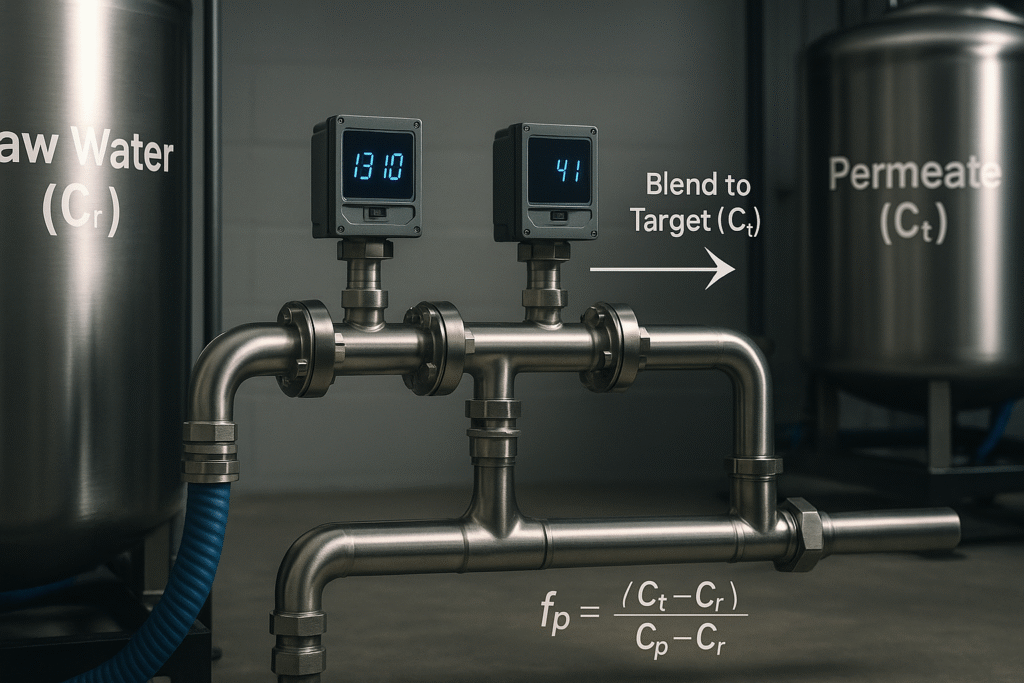Calculadora de mezcla de permeados
Qué hace esta calculadora de mezcla de permeado
Calculadora de mezcla de permeados mezcla agua bruta (conductividad/TDS = Cr) y Permeado de ósmosis inversa (Cp) para alcanzar un objetivo de conductividad/TDS (Ct). Devuelve el fracción de permeado y flujos divididos (Qp, Qr) para un caudal total de mezcla especificado. Los resultados se pueden compartir por URL y exportar a CSV, para que ingenieros y operarios revisen los mismos supuestos y cifras.
Cuándo utilizarlo
- El agua acabada debe mantenerse dentro de una ventana de conductividad/TDS (por ejemplo, potable, alimentación de calderas, enjuague de procesos).
- Desea volver a mezclar una pequeña porción de agua bruta para reducir el coste o ajustar la alcalinidad/sensación.
- Durante el pilotaje o la puesta en marcha, se necesitan estimaciones rápidas de las relaciones y los caudales en diferentes puntos de ajuste.
Explicación de las entradas
- Unidad de valorμS/cm (conductividad) o TDS (mg/L). Mantenga las unidades coherentes en todas las entradas.
- Agua bruta (Cr)conductividad de alimentación/TDS.
- Permeado (Cp): Conductividad del permeado de ósmosis inversa/TDS.
- Objetivo (Ct)conductividad/TDS deseada de la corriente mezclada.
- Caudal total de mezcla: flujo mixto objetivo; la herramienta genera Qp y Qr.
Balance de masa y fórmula
Suponiendo una mezcla lineal a temperatura y CO2 estado:
Ct = fp-Cp + (1 - fp)-Cr ⇒ fp = (Ct - Cr) / (Cp - Cr).
Entonces Qp = fp-Qtotal y Qr = (1 - fp)-Qtotal.
Ejemplo práctico
Cr=1500 μS/cm, Cp=60 μS/cm, Ct=200 μS/cm, Qtotal=1000 LPH.
fp = (200-1500)/(60-1500) = 1300/1440 ≈ 90.3%.
Qp ≈ 903 LPH, Qr ≈ 97 LPH.
Unidades y conversiones rápidas
| Artículo | Regla general | Notas |
|---|---|---|
| Conductividad ↔ TDS | TDS ≈ Conductividad × 0,5-0,7 | Depende de la composición iónica; verificar in situ. |
| LPH ↔ m³/h | 1000 LPH = 1 m³/h | Utilice unidades de caudal coherentes en la herramienta. |
Buenas prácticas y advertencias
- Muestra y mezcla a similar temperatura; las grandes diferencias afectan a las lecturas.
- La conductividad/TDS depende de la composición iónica; si el CO2 el equilibrio o las reacciones de dosificación cambian, verifíquelo in situ y mantenga un margen de seguridad.
- Este calculadora de mezcla de permeados es una estimación de ingeniería; finalice los puntos de ajuste con instrumentos en línea y datos de tendencias.
Lecturas relacionadas
En cuanto a la tendencia a la descamación/corrosión, véase un resumen del Índice de saturación de Langelier (LSI). Utilice LSI junto con el diseño del antiincrustante y las mediciones con corrección de temperatura.
De calculadora a paquete configurado
¿Necesita una referencia configurada? Consulte la Solución de tratamiento de agua por ósmosis inversa de 1000 LPH (arquitectura, indicadores clave de rendimiento y orientaciones de operación y mantenimiento). También puede modelizar los costes operativos con nuestro Calculadora OPEX.
Qué hace esta calculadora de mezcla de permeado
Calculadora de mezcla de permeados mezcla agua bruta (conductividad/TDS = Cr) y Permeado de ósmosis inversa (Cp) para alcanzar un objetivo de conductividad/TDS (Ct). Devuelve el fracción de permeado y flujos divididos (Qp, Qr) para un flujo de mezcla total especificado. Los resultados se pueden compartir por URL y exportar a CSV.
Cuándo utilizarlo
- El agua acabada debe mantenerse dentro de una ventana de conductividad/TDS (por ejemplo, potable, alimentación de calderas, enjuague de procesos).
- Desea volver a mezclar una pequeña porción de agua bruta para reducir el coste o ajustar la alcalinidad/sensación.
- Durante el pilotaje o la puesta en marcha, se necesitan estimaciones rápidas de las relaciones y los caudales en diferentes puntos de ajuste.
Explicación de las entradas
- Unidad de valorμS/cm (conductividad) o TDS (mg/L). Mantenga las unidades coherentes en todas las entradas.
- Agua bruta (Cr)conductividad de alimentación/TDS.
- Permeado (Cp): Conductividad del permeado de ósmosis inversa/TDS.
- Objetivo (Ct)conductividad/TDS deseada de la corriente mezclada.
- Caudal total de mezcla: flujo mixto objetivo; la herramienta genera Qp y Qr.
Balance de masa y fórmula
Suponiendo una mezcla lineal a temperatura y CO2 estado:
Ct = fp-Cp + (1 - fp)-Cr ⇒
fp = (Ct - Cr) / (Cp - Cr).
Entonces Qp = fp-Qtotal y Qr = (1 - fp)-Qtotal.
Ejemplo práctico
Cr=1500 μS/cm, Cp=60 μS/cm, Ct=200 μS/cm, Qtotal=1000 LPH.
fp = (200-1500)/(60-1500) = 1300/1440 ≈ 90.3%.
Qp ≈ 903 LPH, Qr ≈ 97 LPH.
Buenas prácticas y advertencias
- Muestra y mezcla a similar temperatura; las grandes diferencias afectan a las lecturas.
- La conductividad/TDS depende de la composición iónica; si el CO2 el equilibrio o las reacciones de dosificación cambian, verifíquelo in situ y mantenga un margen de seguridad.
- Esta herramienta es una estimación de ingeniería; finalice los puntos de ajuste con instrumentos en línea y datos de tendencias.
¿Necesita una referencia configurada? Consulte la Solución de tratamiento de agua por ósmosis inversa de 1000 LPH (arquitectura, indicadores clave de rendimiento y directrices de operación y mantenimiento).
PREGUNTAS FRECUENTES
¿Supone la calculadora de mezcla de permeado una mezcla lineal?
Sí. Supone una mezcla lineal a temperatura y estado de CO₂ similares. Verifique in situ si se esperan cambios químicos o de temperatura.
¿Puedo utilizar TDS en lugar de conductividad?
Sí. Utilice una unidad coherente (TDS o μS/cm) en todas las entradas. En caso de conversión, aplique el factor de su instalación y verifíquelo con los contadores en línea.
¿Y si el resultado requiere más permeado del disponible?
Reduzca el valor objetivo o aumente la disponibilidad de permeado. También puede pulir una parte del flujo bruto para reducir el Cᵣ.
¿Cuál es la precisión de la estimación?
Se trata de una estimación de ingeniería para la planificación y la puesta en marcha. Los valores de consigna definitivos deben confirmarse con instrumentos en línea y datos de tendencias.

